Filtration

FILTER OUT THE COMPETITIONFILTRATION EXPLAINED The primary function of any vehicle filter is simple: to prevent particles from entering its various sections. The four basic kinds of filters: air, fuel, cabin and oil and their replacement presents high and consistent demand to the aftermarket. 1. OIL FILTER
The oil filter is a vital part of the lubrication process and offers total protection for correct engine operation. It also traps unwanted microscopic contaminants and prevents abrasive wear of the bearings. It is recommended that an oil filter must be replaced with each oil change as its failure can starve the engine of oil. 2. AIR FILTER The air filter is a key component in the air inlet system which filters the air that passes through the combustion chamber. A blocked air filter will have a direct effect on engine performance, restricting air flow into the engine. 3. FUEL FILTER The fuel filter is specifically more critical on diesel applications as water, dirt and particulates need to be prevented from entering the injectors and pump. Fuel filters need regular maintenance to avoid a drop in engine performance and should always be replaced with the fuel pump. 4. CABIN FILTER The cabin filter primarily prevents pollutants from entering the passenger compartment and ensures improved air quality and comfort inside the car, even in extreme weather conditions.
More than 90% of new vehicles are equipped with cabin filters and they are a standard service item, creating a strong sales and profit opportunity.
|
Related Articles Related Downloads |
